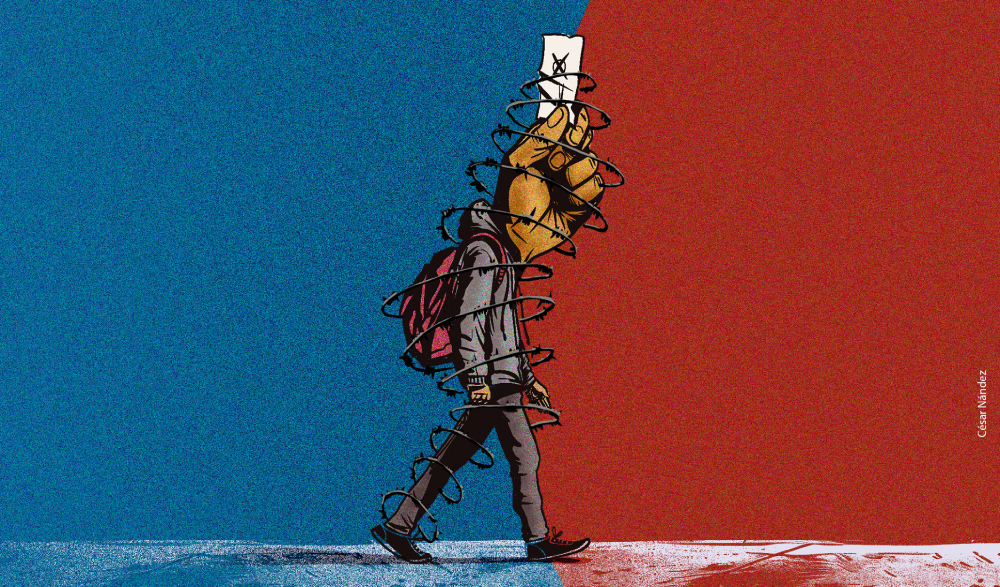In the Americas this year, elections are expected in the United States, Mexico, Costa Rica, Panama, Dominican Republic, Puerto Rico, Venezuela, Brazil, Chile, and Uruguay. Worldwide, over 50 elections are expected. Although the contexts of each country are different and there are marked differences in some cases, there are common issues or regional and global problems that affect more than one.
One of these issues is migration and its effects on countries. Recently, it has been evident how migration has become a central part of the campaign speeches of candidates across the political spectrum. On many occasions, narratives that stigmatize migrants and refugees have been presented, promoting xenophobic actions.
Therefore, in this new electoral super-cycle that brings the year 2024, it is very likely that migration will once again play a central role in the public discussion. But, precisely because of its central role, this issue can serve as a scale to know the political positions of public actors and thus determine whether there are more liberal or more coercive positions in their approaches. At least four ideas that can serve as a measure are proposed below.
Freedom of mobility
According to the Universal Declaration of Human Rights, the right to leave one’s own country, to have a nationality, and to seek asylum are inalienable elements of human dignity. In other words, beyond ideological positions, this should be the minimum basis for public discussion. This position has its origins in the events of the Holocaust.
Although the applicability of these universal rights varies from country to country, the willingness of politicians to comply or not with these rights and what is reflected in their narratives is a first yardstick that can be considered when evaluating political positions. The following are examples of positions that allow us to identify discourses that violate these rights.
In July 2023, German parliamentarian Thorsten Frei proposed to abolish the individual right of asylum. While this proposal was met with backlash, including from politicians of his own party (Christian Democratic Union), it set a precedent for questioning the fundamental rights that underpin democratic institutions and the rule of law. On the other hand, in May 2023, during a campaign speech, former President Donald Trump stated that, if he won the presidency again, he would end birthright citizenship for the children of illegal immigrants. This proposal implies not only the violation of a fundamental human right but also a step backward, since it transfers an individual responsibility or immigration status (parents) to another person (children), as if faults or irregularities were hereditary. Likewise, in December 2023, the Secretary for Work and Pensions of the United Kingdom, Mel Stride, indicated that legal migration figures are very high and that they are concerned. In Latin America, there are also precedents of similar practices. For example, in Chile, the courts upheld the expulsion of children and adolescents (NNA) with migrant parents, although the children have Chilean nationality.
Stigmatization by nationality
Another aspect that should be an indicator to identify politicians and narratives that undermine human dignity is stigmatization based on nationality, at the root of which there is an interest in attributing to social or ethnic groups responsibilities for certain individuals. Moreover, discrimination based on nationality is prohibited under Article 2 of the Universal Declaration of Human Rights, as ratified by other bodies such as the Inter-American Commission on Human Rights.
Despite these guarantees of rights, in practice, it is also possible to observe politicians stigmatizing people based on nationality, which promotes the construction of ideas of xenophobia and invalidates the status of members of certain groups as subjects of rights.
Among the most striking examples, the Latin American region is one of the places where this discriminatory practice is most evident. In April 2023, the president of Peru, Dina Boluarte, declared a state of emergency at the borders and directly blamed Venezuelans and Haitians for the increase in crime without presenting evidence. This procedure not only denies the state’s responsibility for public security but also promotes a vision of crime not as a phenomenon carried out by individuals but by groups. Just because they belong to a certain nationality, it is presumed that they are criminals.
Another case that can be identified is Mexico: after a fire in an immigration detention center with more than 40 people dead, President Andrés Manuel López Obrador blamed the migrants themselves for this situation. The tendency to deny the responsibility of the state and attribute it to a certain group is repeated. In the Dominican Republic, President Luis Abinader indicated the intention to finance the mechanization of the different construction sectors to reduce foreign labor from Haiti. Finally, in January 2024, during the internal armed conflict in Ecuador, the former General of the National Police of Peru and former Minister of the Interior Eduardo Perez Rocha blamed Venezuelan migration for the situation in that country.
Sudden expulsions
Expulsions, or quicker returns of migrants, is another indicator to identify policies and practices that go against the individual rights of people and violate the rule of law. Typically, these expulsions of migrants or refugees are carried out without access to due process and without the ability to challenge the act through an effective judicial remedy. In addition, these are sometimes collective expulsions, not individual expulsions, in which people do not have the opportunity to explain their circumstances, apply for asylum, or appeal the decision.
In this case of expulsions, beyond particular statements or narratives of politicians, it can be identified that they are policies and actions of state institutions. But these practices must be properly identified and who are the decision-makers that support or promote such policies. Some examples are shown below.
In March 2023, the government of Gabriel Boric in Chile obtained support in Parliament to modify a law that allows for expedited expulsions of migrants in its territory. In Peru, also during 2023, the government issued a decree modifying the migration law to allow for the rapid expulsion of foreigners with irregular status in the country. In both cases, these are modifications of laws that were previously established under a framework of rights protection and were modified harming the individual rights of migrants. The migration phenomenon requires better capacities of the state to address its multiple challenges, but it seems easier to restrict individual rights than to improve the capacities of institutions. Similar precedents exist in other regions. For example, in ministerial meetings of the European Union, calls have been made to implement rapid deportations. This is something that has also happened in the United States and was reported with concern in the media.
Against the migrant vote
Finally, one last aspect to consider when assessing political narratives on migration is the position regarding the vote of migrants in their countries of residence. According to the United Nations International Covenant on Civil and Political Rights, everyone has the right to take part in the conduct of public affairs, to vote, and to be elected to public office.
Although this right is adapted to the legislation of each country, it is possible to find practices by political actors that are detrimental to this right toward migrants. In some cases, these practices are based on the instrumentalization of migrants. In other cases, they are based on the stigmatization of migrants’ right to vote or on the imposition of structural barriers that prevent the free exercise of this right.
For example, a study in the context of the U.S. midterm elections in 2022 indicated that 1 in 3 people feared that immigrants would influence the elections. This is in line with expressions on social networks and television by journalists such as Tucker Carlson. In Spain, for municipal elections, only immigrants whose countries of origin have some reciprocity agreement, international treaties or who are from the European Union can vote. It is estimated that more than 6 million immigrants and children of immigrants cannot vote or be voted for by citizens. In Latin American, there are also challenging cases: in January 2024, a candidate for Mexico City was denounced for using Haitian migrants for proselytizing activities. However, these people do not have the right to vote in the country. In the case of Argentina, resident migrants cannot exercise the right to vote in national elections but can vote in provincial and municipal elections. In the City of Buenos Aires, foreigners represent 16% of the electoral roll. But participation is not high and the dialogue of political parties with this population is not dynamic. There is little interest in migrants exercising their right to vote.
The issue of migration versus democracy and freedom
Migration is a phenomenon that highlights the contradictions of current political systems, where it is difficult to preserve a system of freedoms and coexistence through effective citizen security. It calls into question agreements, as well as fundamental and universal rights that have been in force for almost 80 years. This is not a problem of left or right. In the examples above, we can see how governments of different types have agreed to violate rights inherent to human dignity.
The real problem seems to be linked to the imposition of a collective vision over a vision centered on individuals. It is an existential challenge. Visions that promote migrants as homogenous groups to be controlled are detrimental to human rights. Moreover, in the face of any failure on the part of states to ensure security or economic well-being, they become the main scapegoat. In the past, when these collective and packaged visions were imposed and accepted by society, regimes such as Nazism or Soviet communism soon emerged.
For these reasons, at an important electoral moment for many, it is recommended to pay special attention to the political positions on migration concerning these four ideas presented: freedom of mobility, stigmatization by nationality, sudden expulsions, and position toward the migrant vote.
We must be attentive to positions that, far from resolving the challenges faced by societies, opt for easy solutions and seek to violate the rights of migrants. It is necessary to promote the defense of the individual dignity of each person in this situation. The attack of politicians against migrants can set a precedent to advance in the violation of other rights and attack the democratic institutions of the countries. For the freedom of all, let us take advantage of this election year to not be indifferent to migration.
*Translated by Janaína Ruviaro da Silva from the original in Spanish.












